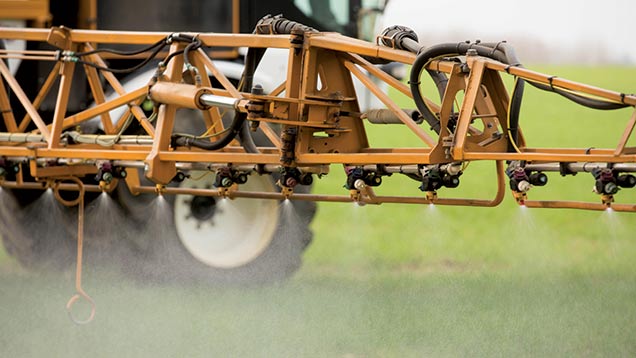Kenyan biopesticides success brings hope for UK crop pest control
 ©Tim Scrivener
©Tim Scrivener A Buckinghamshire farmer has set up a new company with the aim of bringing new biopesticide technology to UK growers in the next five years.
Antony Pearce, who farms just over 1,000ha of cropping near Aylesbury, highlights how biopesticides have helped Kenyan farmers halve their fungicide use.
Along with fellow farmers he has helped set up Real IPM UK, with the intention of getting registration for these pesticides in the EU and making them available to UK farmers.
See also: Kenyan farmers show the way on biopesticides
Mr Pearce explains he wants to take them from being niche products for high-value vegetable crops in glasshouses to being used on broad-acre crops, and would like to see them come to market in the next four to five years.
He believes with growing resistance to conventional sprays and fewer active ingredients in a farmer’s armoury, biopesticides could offer huge benefits to UK growers.
Biopesticides explained
Biopesticides are naturally occurring organisms – such as insects, bacteria and fungi – that are exploited to control specific crop pests and diseases.
One Kenyan example is Real Metarhizium anisopliae 78 – a ubiquitous, insect-killing fungus that comes from the soil, targeting pests such as spider mites and Trichoderma evansii without killing predatory mites.
Spores attach to the mite pest before germinating and entering its body, where they multiply, killing it within two to four days.
Kenyan benefits
The biological agents are already proving their worth in Kenya, where they enable flower producers to reduce the use of conventional pesticides by as much as 50%.
The biopesticides can be used in a variety of crops, with registration in certain countries already allowing for nematode control in beans and ongoing work looking at managing wheat stem rust.
However, Louise Labuschagne director of Real IPM, which developed the biopesticides in Kenya, believes UK arable farmers are being denied the benefits of biopesticides as a result of costly regulations.
The cost of an approval of a biopesticide in Kenya is £10,000 compared with £1m in Europe, which uses the same regulatory system as it does for traditional agrochemicals.
“Keeping the costs down will be key to ensure they can be used prophylactically, as they are in Kenya,” says Mr Pearce.
Janet Williams of Bayer CropScience, which manufactures Serenade, a biofungicide with approval in the UK, says it goes through a similar approval process to conventional pesticides.
A big challenge getting biopesticides approved is achieving the required consistency of efficacy and maintaining storage stability in line with chemicals from a living organism, she says.
“We believe biologicals already are and will be part of the toolbox growers use to protect their crops in the future. They are best used within integrated control strategies alongside conventional chemistry,” she says.
Practical use
Mr Pearce points out that any products that come to the UK market would be able to slot into any farming system, and can be applied using a conventional boom sprayer.
“They are easy to store and have a good shelf life, but the only consideration is growers and agronomists need to have a greater pest and product knowledge to apply it at the most appropriate time,” he says.
Mr Pearce is now meeting Dutch regulators to find a cheaper avenue to bring them to the UK market. Once licensed in Holland, where broad-acre field trials are easier and cheaper to carry out, products are more likely to be given the go-ahead in the UK, although UK regulators can still delay the move and ask for more data, he explains.
Real IPM UK is now looking for farmers who want to invest in helping to take the product through the regulatory process.

